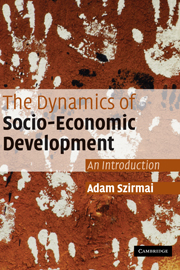Book contents
- Frontmatter
- Contents
- List of figures
- List of tables
- List of boxes
- Preface
- List of abbreviations
- Acknowledgements
- Chapter 1 Developing countries and the concept of development
- Chapter 2 Development of the international economic order, 1450–2000
- Chapter 3 Growth and stagnation: theories and experiences
- Chapter 4 Technology and development
- Chapter 5 Population and development
- Chapter 6 Health, health care and development
- Chapter 7 Education and development
- Chapter 8 Economic development, structural transformation and primary exports
- Chapter 9 Industrial development
- Chapter 10 Agricultural development and rural development
- Chapter 11 State formation and political aspects of development
- Chapter 12 Cultural dimensions of development
- Chapter 13 The international economic and political order since 1945
- Chapter 14 Foreign aid and development
- Bibliography
- Author index
- Subject index
Chapter 1 - Developing countries and the concept of development
Published online by Cambridge University Press: 05 June 2012
- Frontmatter
- Contents
- List of figures
- List of tables
- List of boxes
- Preface
- List of abbreviations
- Acknowledgements
- Chapter 1 Developing countries and the concept of development
- Chapter 2 Development of the international economic order, 1450–2000
- Chapter 3 Growth and stagnation: theories and experiences
- Chapter 4 Technology and development
- Chapter 5 Population and development
- Chapter 6 Health, health care and development
- Chapter 7 Education and development
- Chapter 8 Economic development, structural transformation and primary exports
- Chapter 9 Industrial development
- Chapter 10 Agricultural development and rural development
- Chapter 11 State formation and political aspects of development
- Chapter 12 Cultural dimensions of development
- Chapter 13 The international economic and political order since 1945
- Chapter 14 Foreign aid and development
- Bibliography
- Author index
- Subject index
Summary
This introductory chapter focuses on the concept of development. The low standard of living of the mass of the population in developing countries is singled out as the key issue in development. The development of per capita income over time and the factors that influence economic development or stagnation are important topics in this book. However, the interplay between economic and non-economic factors is of great importance for our understanding of the dynamics of socio-economic development. Economic development cannot be explained by economic factors only, and the concept of development includes more than mere changes in economic indicators.
After a discussion of problems of involvement and detachment in the study of development issues in sections 1.1 and 1.2, we examine the concept of development in sections 1.3 to 1.5. Indicators of growth and development are presented in section 1.6. Section 1.7 highlights the differences between developing countries and the variety of development experiences. The final section addresses the question of what developing countries have in common in spite of all their differences.
Approaches to development
In discussions of development issues two general approaches can be distinguished (see Myint, 1980):
1. The fight against poverty This approach focuses on the problems of widespread poverty, hunger and misery in developing countries and on the question of what can be done in order to realise improvements of the situation in the short term.
[…]
- Type
- Chapter
- Information
- The Dynamics of Socio-Economic DevelopmentAn Introduction, pp. 1 - 34Publisher: Cambridge University PressPrint publication year: 2005



